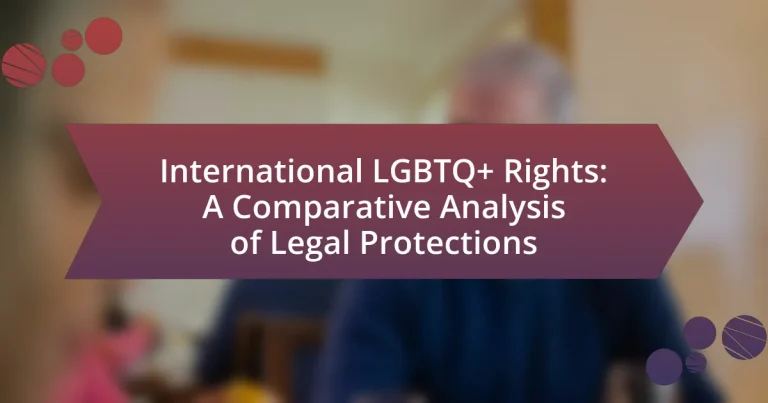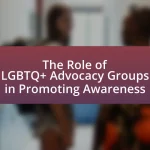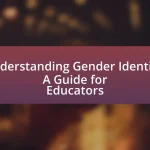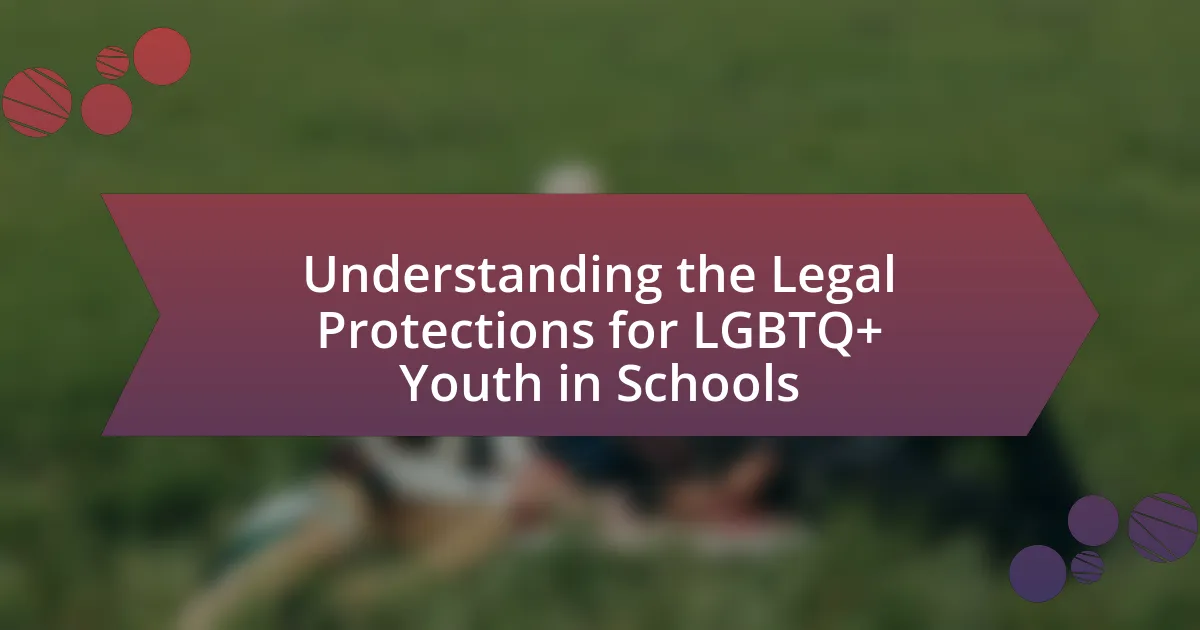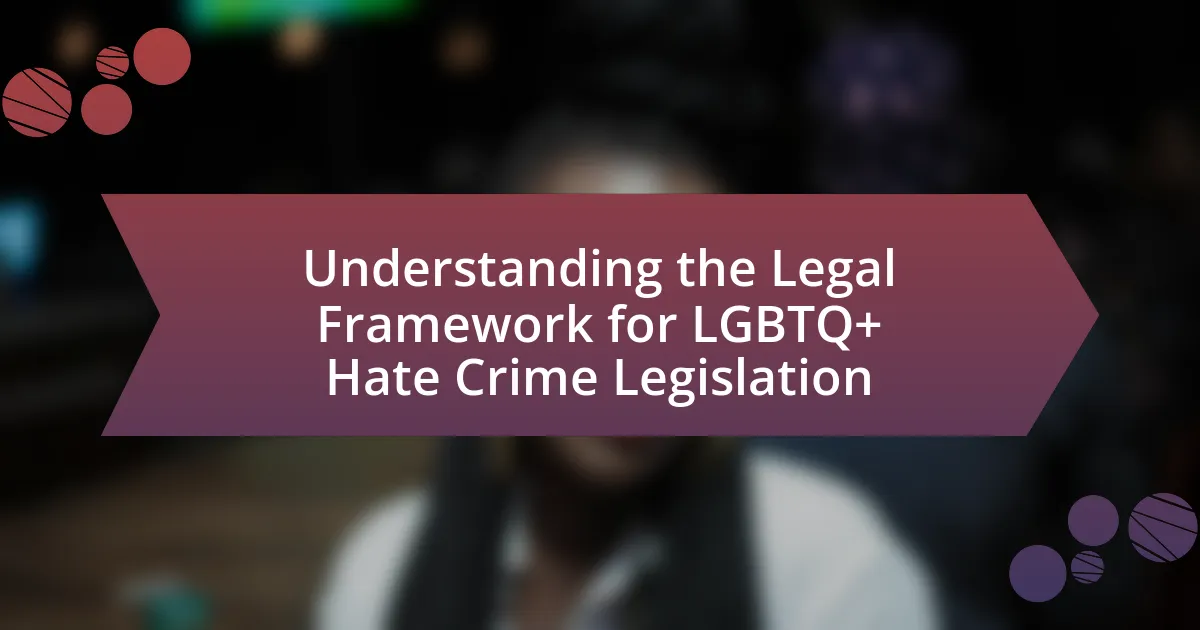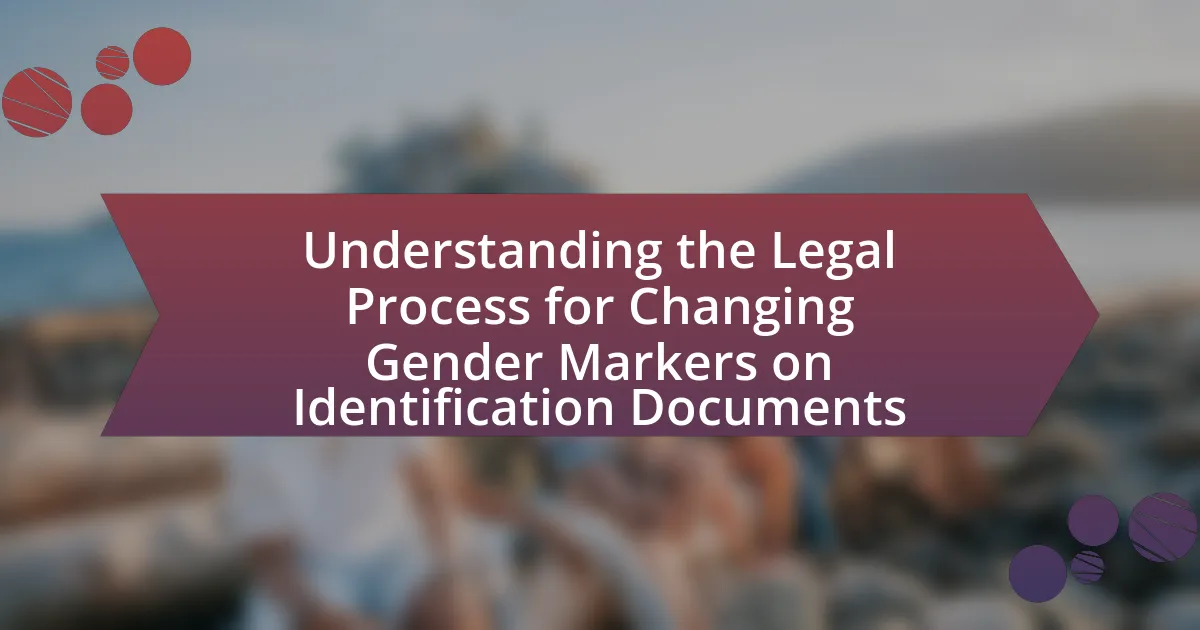International LGBTQ+ rights encompass the legal protections and recognition of individuals based on their sexual orientation and gender identity across various countries. This article provides a comprehensive analysis of the evolution of these rights, highlighting significant historical events, cultural influences, and legal frameworks that shape the current landscape. It examines the disparities in legal protections, the role of international treaties, and the impact of societal attitudes on the implementation of LGBTQ+ rights. Additionally, the article discusses the challenges faced by LGBTQ+ individuals globally, the contributions of international organizations and NGOs, and emerging trends in advocacy and legal reforms aimed at promoting equality and acceptance.

What are International LGBTQ+ Rights?
International LGBTQ+ rights refer to the legal protections and recognition afforded to individuals based on their sexual orientation and gender identity across different countries. These rights encompass various aspects, including the decriminalization of same-sex relationships, anti-discrimination laws, marriage equality, and the right to adopt children. For instance, as of 2023, over 30 countries have legalized same-sex marriage, while many others have enacted laws to protect LGBTQ+ individuals from discrimination in employment and housing. The Universal Declaration of Human Rights, adopted by the United Nations in 1948, serves as a foundational document asserting that all individuals, regardless of sexual orientation or gender identity, are entitled to the same rights and freedoms.
How have International LGBTQ+ Rights evolved over time?
International LGBTQ+ rights have evolved significantly over time, transitioning from criminalization and social stigma to increasing legal recognition and protections. In the mid-20th century, many countries enforced laws that criminalized same-sex relationships, exemplified by the widespread use of sodomy laws. The 1969 Stonewall Riots in the United States marked a pivotal moment, igniting the modern LGBTQ+ rights movement and leading to the decriminalization of homosexuality in various jurisdictions.
By the late 20th century, several nations began to adopt anti-discrimination laws and recognize same-sex relationships, with the Netherlands becoming the first country to legalize same-sex marriage in 2001. The 21st century has seen a rapid expansion of rights, with over 30 countries legalizing same-sex marriage by 2023, and many others implementing legal protections against discrimination based on sexual orientation and gender identity.
Internationally, organizations such as the United Nations have increasingly advocated for LGBTQ+ rights, with the UN Human Rights Council passing resolutions affirming the rights of LGBTQ+ individuals. Despite this progress, challenges remain, as many countries still impose severe penalties for homosexuality, highlighting the ongoing struggle for equality and protection worldwide.
What historical events have shaped the current landscape of LGBTQ+ rights?
The current landscape of LGBTQ+ rights has been shaped by several pivotal historical events, including the Stonewall Riots of 1969, which marked a significant turning point in the fight for LGBTQ+ rights in the United States. The riots were a response to a police raid at the Stonewall Inn in New York City, leading to widespread protests and the formation of advocacy groups such as the Gay Liberation Front. This event catalyzed the modern LGBTQ+ rights movement, inspiring similar activism globally.
Another critical event was the decriminalization of homosexuality in various countries, starting with the UK in 1967, which set a precedent for legal reforms worldwide. The AIDS crisis in the 1980s also played a crucial role, as it galvanized the LGBTQ+ community and allies to demand healthcare rights and anti-discrimination protections, leading to significant legislative changes.
Additionally, the legalization of same-sex marriage in countries like the Netherlands in 2001 and later in the U.S. in 2015 through the Supreme Court case Obergefell v. Hodges further solidified legal recognition of LGBTQ+ rights. These events collectively illustrate the evolution of societal attitudes and legal frameworks surrounding LGBTQ+ rights, demonstrating a gradual but significant shift towards equality and acceptance.
How do cultural attitudes influence the evolution of LGBTQ+ rights globally?
Cultural attitudes significantly influence the evolution of LGBTQ+ rights globally by shaping societal norms and legal frameworks. In regions where acceptance of LGBTQ+ identities is prevalent, such as in many Western countries, legal protections and rights have advanced rapidly, evidenced by the legalization of same-sex marriage in over 30 countries since 2001. Conversely, in cultures with strong conservative or religious beliefs, such as in parts of Africa and the Middle East, LGBTQ+ individuals often face criminalization and discrimination, as seen in countries like Uganda and Saudi Arabia, where laws impose severe penalties for same-sex relationships. These cultural attitudes directly impact the political will to enact or repeal laws affecting LGBTQ+ rights, demonstrating that societal perceptions are crucial in determining the legal landscape for LGBTQ+ individuals worldwide.
What are the key legal protections for LGBTQ+ individuals worldwide?
Key legal protections for LGBTQ+ individuals worldwide include anti-discrimination laws, marriage equality, and the decriminalization of same-sex relationships. Many countries have enacted laws that prohibit discrimination based on sexual orientation and gender identity in employment, housing, and public services. For instance, as of 2023, over 70 countries recognize same-sex marriage, providing legal recognition and rights to LGBTQ+ couples. Additionally, numerous nations have decriminalized same-sex relationships, with countries like India and Botswana recently overturning colonial-era laws that criminalized homosexuality. These legal frameworks are essential for safeguarding the rights and dignity of LGBTQ+ individuals globally.
What international treaties and agreements support LGBTQ+ rights?
International treaties and agreements that support LGBTQ+ rights include the Yogyakarta Principles, the International Covenant on Civil and Political Rights (ICCPR), and the Convention on the Elimination of All Forms of Discrimination Against Women (CEDAW). The Yogyakarta Principles, established in 2006, provide a framework for applying international human rights law to issues of sexual orientation and gender identity. The ICCPR, adopted in 1966, obligates state parties to respect and ensure the rights to equality and non-discrimination, which encompasses protections for LGBTQ+ individuals. CEDAW, adopted in 1979, has been interpreted to include protections against discrimination based on sexual orientation and gender identity, thereby supporting LGBTQ+ rights within the context of women’s rights.
How do national laws vary in their protection of LGBTQ+ rights?
National laws vary significantly in their protection of LGBTQ+ rights, with some countries offering comprehensive legal protections while others impose severe restrictions or criminalize LGBTQ+ identities. For example, countries like Canada and the Netherlands have enacted laws that protect against discrimination based on sexual orientation and gender identity, allowing same-sex marriage and adoption rights. In contrast, nations such as Saudi Arabia and Uganda have laws that criminalize same-sex relationships, leading to severe penalties, including imprisonment or even death. This disparity in legal frameworks reflects broader cultural, religious, and political attitudes towards LGBTQ+ individuals, influencing the extent of rights and protections available in different jurisdictions.
Why is a comparative analysis of LGBTQ+ rights important?
A comparative analysis of LGBTQ+ rights is important because it highlights the disparities in legal protections and social acceptance across different countries. By examining these differences, researchers can identify patterns, assess the effectiveness of various legal frameworks, and advocate for policy changes that promote equality. For instance, countries like Canada and the Netherlands have comprehensive anti-discrimination laws and marriage equality, while others, such as Saudi Arabia and Uganda, impose severe penalties for LGBTQ+ identities. This analysis not only informs activists and policymakers but also raises awareness about the ongoing struggles faced by LGBTQ+ individuals globally, thereby fostering international solidarity and support for human rights initiatives.
What insights can be gained from comparing different countries’ approaches?
Comparing different countries’ approaches to LGBTQ+ rights reveals significant variations in legal protections and societal acceptance. For instance, countries like Canada and the Netherlands have comprehensive anti-discrimination laws and marriage equality, while others, such as Russia and Uganda, enforce punitive measures against LGBTQ+ individuals. This contrast highlights how cultural, political, and historical contexts shape legal frameworks. Furthermore, studies indicate that nations with inclusive policies tend to experience lower rates of hate crimes and better mental health outcomes among LGBTQ+ populations, demonstrating the positive impact of legal protections on societal well-being.
How does this analysis impact advocacy and policy-making?
This analysis impacts advocacy and policy-making by providing a comprehensive understanding of the legal protections available to LGBTQ+ individuals across different countries. By highlighting disparities and successes in legal frameworks, advocates can tailor their strategies to address specific gaps in protections. For instance, the analysis may reveal that countries with comprehensive anti-discrimination laws have lower rates of violence against LGBTQ+ individuals, which can inform policy recommendations aimed at enhancing legal protections in less progressive regions. Furthermore, empirical data from the analysis can serve as a persuasive tool for advocacy groups, enabling them to effectively lobby for legislative changes by demonstrating the positive outcomes associated with robust legal protections for LGBTQ+ rights.

What are the challenges facing LGBTQ+ rights internationally?
LGBTQ+ rights face significant challenges internationally, including legal discrimination, social stigma, and violence. Many countries still enforce laws criminalizing same-sex relationships, with over 70 nations maintaining such legislation, which directly impacts the safety and rights of LGBTQ+ individuals. Additionally, cultural and religious beliefs often perpetuate discrimination, leading to widespread social stigma that marginalizes LGBTQ+ communities. Reports from organizations like Human Rights Watch indicate that violence against LGBTQ+ individuals, including hate crimes, remains prevalent in various regions, further complicating the fight for equality. These challenges create a complex landscape for LGBTQ+ rights, hindering progress toward legal protections and social acceptance globally.
What legal barriers exist for LGBTQ+ individuals in various countries?
Legal barriers for LGBTQ+ individuals vary significantly across countries, with many facing criminalization, lack of legal recognition, and discrimination. For instance, in countries like Saudi Arabia and Iran, homosexuality is punishable by death, reflecting severe legal repercussions. In contrast, nations such as Russia enforce laws against “propaganda of non-traditional sexual relationships,” which restricts LGBTQ+ advocacy and expression. Furthermore, in several countries, same-sex relationships are not legally recognized, denying LGBTQ+ individuals access to marriage rights, adoption, and inheritance. According to the International Lesbian, Gay, Bisexual, Trans and Intersex Association (ILGA), as of 2021, 69 countries still criminalize same-sex relationships, highlighting the pervasive legal barriers that hinder LGBTQ+ rights globally.
How do discriminatory laws affect the lives of LGBTQ+ individuals?
Discriminatory laws significantly harm the lives of LGBTQ+ individuals by perpetuating inequality and limiting their rights. These laws can lead to social stigmatization, increased violence, and mental health issues among LGBTQ+ populations. For instance, in countries where same-sex relationships are criminalized, individuals face legal repercussions, including imprisonment, which fosters an environment of fear and isolation. According to a 2020 report by ILGA World, 69 countries still criminalize same-sex relationships, contributing to widespread discrimination and human rights abuses. Furthermore, discriminatory laws often restrict access to essential services such as healthcare and employment, exacerbating economic disparities and health outcomes for LGBTQ+ individuals.
What role does enforcement play in the effectiveness of LGBTQ+ rights protections?
Enforcement is crucial for the effectiveness of LGBTQ+ rights protections, as it ensures that laws are not only enacted but also implemented and upheld. Without robust enforcement mechanisms, legal protections can remain mere formalities, failing to provide real security and justice for LGBTQ+ individuals. For instance, countries with strong enforcement frameworks, such as the Netherlands, demonstrate lower rates of discrimination and violence against LGBTQ+ individuals, highlighting the correlation between enforcement and the practical realization of rights. Conversely, in nations where enforcement is weak or absent, such as in some regions of Eastern Europe, LGBTQ+ individuals often face significant risks and violations of their rights, illustrating that enforcement directly impacts the lived experiences of these communities.
How do social attitudes impact the implementation of LGBTQ+ rights?
Social attitudes significantly influence the implementation of LGBTQ+ rights by shaping public opinion, legislative priorities, and the political climate. For instance, in countries where societal acceptance of LGBTQ+ individuals is high, such as Canada and the Netherlands, comprehensive legal protections and rights have been established, including marriage equality and anti-discrimination laws. Conversely, in regions with prevalent negative attitudes, like parts of Africa and the Middle East, LGBTQ+ rights are often severely restricted, with laws criminalizing same-sex relationships and limited legal recourse for discrimination. Research by the Pew Research Center indicates that societal acceptance correlates with the advancement of legal protections, demonstrating that positive social attitudes can lead to more robust LGBTQ+ rights frameworks.
What are the consequences of societal stigma on LGBTQ+ individuals?
Societal stigma against LGBTQ+ individuals leads to significant mental health issues, including increased rates of anxiety, depression, and suicidal ideation. Research indicates that LGBTQ+ individuals experience higher levels of discrimination and social isolation, which contribute to these mental health challenges. For instance, a study published in the American Journal of Public Health found that LGBTQ+ youth are more than twice as likely to experience mental health problems compared to their heterosexual peers. Additionally, societal stigma can result in reduced access to healthcare and social services, further exacerbating health disparities within this community.
How can public awareness campaigns improve LGBTQ+ rights?
Public awareness campaigns can improve LGBTQ+ rights by educating the public, reducing stigma, and fostering acceptance. These campaigns often highlight the challenges faced by LGBTQ+ individuals, which can lead to increased empathy and support from the broader community. For instance, studies show that regions with active awareness campaigns experience a measurable decrease in hate crimes and discrimination against LGBTQ+ individuals. According to a 2019 report by the Human Rights Campaign, areas with comprehensive public education initiatives saw a 20% increase in support for LGBTQ+ rights over five years. This demonstrates that informed communities are more likely to advocate for equitable policies and legal protections, ultimately advancing LGBTQ+ rights on a societal level.
What role do international organizations play in promoting LGBTQ+ rights?
International organizations play a crucial role in promoting LGBTQ+ rights by establishing international norms, providing advocacy, and facilitating dialogue among member states. Organizations such as the United Nations and the European Union actively work to integrate LGBTQ+ rights into human rights frameworks, influencing national policies and legislation. For instance, the UN Free & Equal campaign aims to raise awareness and combat discrimination against LGBTQ+ individuals globally, highlighting the importance of equal rights as fundamental human rights. Additionally, international treaties and resolutions, such as the Yogyakarta Principles, guide states in implementing protections for LGBTQ+ individuals, reinforcing the legal obligations of countries to uphold these rights.
How do NGOs contribute to the advancement of LGBTQ+ rights globally?
NGOs contribute to the advancement of LGBTQ+ rights globally by advocating for legal reforms, providing support services, and raising awareness about LGBTQ+ issues. These organizations engage in lobbying efforts to influence policymakers and promote inclusive legislation, such as marriage equality and anti-discrimination laws. For instance, the International Lesbian, Gay, Bisexual, Trans and Intersex Association (ILGA) has documented over 70 countries where same-sex relationships are criminalized, highlighting the need for legal protections. Additionally, NGOs offer resources such as legal aid, mental health support, and safe spaces for LGBTQ+ individuals, which are crucial in regions where discrimination is prevalent. Their efforts also include educational campaigns that challenge societal norms and promote acceptance, thereby fostering a more inclusive environment for LGBTQ+ communities worldwide.
What partnerships are essential for effective advocacy?
Coalitions with LGBTQ+ organizations, human rights groups, and governmental bodies are essential for effective advocacy. These partnerships enhance visibility, mobilize resources, and amplify voices in the fight for legal protections. For instance, collaborations between local LGBTQ+ groups and international human rights organizations have historically led to significant policy changes, such as the decriminalization of homosexuality in various countries. Additionally, partnerships with legal experts and academic institutions provide critical research and data that support advocacy efforts, ensuring that campaigns are grounded in factual evidence and legal frameworks.

What are the future trends in International LGBTQ+ Rights?
Future trends in international LGBTQ+ rights indicate a growing acceptance and legal recognition of LGBTQ+ individuals globally. Many countries are increasingly enacting anti-discrimination laws and legalizing same-sex marriage, reflecting a shift towards greater equality. For instance, as of 2023, over 30 countries have legalized same-sex marriage, and numerous nations have implemented laws protecting against discrimination based on sexual orientation and gender identity. Additionally, international organizations, such as the United Nations, are advocating for LGBTQ+ rights, influencing national policies and promoting human rights standards. This trend is supported by increasing public support for LGBTQ+ rights, as evidenced by global surveys showing that acceptance rates are rising in various regions, particularly in Europe and the Americas.
How is globalization affecting LGBTQ+ rights worldwide?
Globalization is positively affecting LGBTQ+ rights worldwide by facilitating the spread of progressive ideas and legal frameworks. Increased interconnectedness through international organizations, social media, and global advocacy networks has led to greater awareness and support for LGBTQ+ rights. For instance, the United Nations has recognized LGBTQ+ rights as human rights, influencing countries to adopt more inclusive policies. Additionally, research from the Williams Institute indicates that countries with higher levels of globalization tend to have more comprehensive legal protections for LGBTQ+ individuals, such as marriage equality and anti-discrimination laws. This trend demonstrates that globalization can serve as a catalyst for advancing LGBTQ+ rights on a global scale.
What impact does international travel have on LGBTQ+ rights awareness?
International travel significantly enhances LGBTQ+ rights awareness by exposing travelers to diverse cultural attitudes and legal frameworks regarding LGBTQ+ issues. This exposure often leads to increased understanding and advocacy for LGBTQ+ rights, as individuals witness both progressive and regressive policies in different countries. For instance, a 2019 study by the Williams Institute found that LGBTQ+ travelers often engage in discussions about rights and protections, which can influence their perspectives and actions upon returning home. Additionally, international events such as Pride parades in various countries serve as platforms for raising awareness and fostering solidarity among LGBTQ+ communities globally.
How are transnational movements influencing local LGBTQ+ rights?
Transnational movements are significantly influencing local LGBTQ+ rights by promoting advocacy, sharing resources, and fostering solidarity across borders. These movements, such as the Global Fund for Women and ILGA (International Lesbian, Gay, Bisexual, Trans and Intersex Association), provide financial support and strategic guidance to local organizations, enabling them to challenge discriminatory laws and practices. For instance, the advocacy efforts of transnational networks have led to the decriminalization of homosexuality in several countries, as seen in the case of India where the Supreme Court’s decision in 2018 was influenced by international human rights discourse. Additionally, transnational movements raise awareness about LGBTQ+ issues globally, pressuring local governments to adopt more inclusive policies, as evidenced by the increased visibility of LGBTQ+ rights in international forums like the United Nations.
What emerging legal frameworks are being developed for LGBTQ+ protections?
Emerging legal frameworks for LGBTQ+ protections include comprehensive anti-discrimination laws, marriage equality legislation, and gender identity recognition statutes. Countries such as Taiwan have established marriage equality, becoming the first in Asia to do so in 2019, while nations like Malta have implemented robust anti-discrimination laws that protect LGBTQ+ individuals in various sectors, including employment and healthcare. Additionally, the Yogyakarta Principles, adopted by various international human rights organizations, provide a framework for the protection of LGBTQ+ rights globally, emphasizing the need for legal recognition of gender identity and sexual orientation. These developments reflect a growing trend towards recognizing and safeguarding the rights of LGBTQ+ individuals on an international scale.
How are countries adapting their laws to be more inclusive?
Countries are adapting their laws to be more inclusive by implementing legal protections for LGBTQ+ individuals, such as anti-discrimination laws, marriage equality, and gender identity recognition. For instance, in 2020, Switzerland legalized same-sex marriage, reflecting a broader trend where nations are recognizing the rights of LGBTQ+ communities. Additionally, countries like Canada and Germany have enacted comprehensive anti-discrimination laws that protect individuals based on sexual orientation and gender identity, demonstrating a commitment to inclusivity. These legal changes are often influenced by international human rights standards and advocacy from local and global organizations, which highlight the importance of equality and non-discrimination.
What innovative legal strategies are being employed by advocates?
Advocates are employing innovative legal strategies such as strategic litigation, public interest lawyering, and the use of international human rights frameworks to advance LGBTQ+ rights. Strategic litigation involves selecting cases that can set important legal precedents, thereby influencing broader legal interpretations and protections. Public interest lawyering focuses on representing marginalized communities and ensuring their voices are heard in legal processes. Additionally, leveraging international human rights treaties and bodies, such as the United Nations, allows advocates to hold states accountable for violations of LGBTQ+ rights, as seen in cases where countries have been pressured to reform discriminatory laws. These strategies collectively enhance the legal landscape for LGBTQ+ individuals globally.
What practical steps can individuals take to support LGBTQ+ rights?
Individuals can support LGBTQ+ rights by actively advocating for inclusive policies and legislation. This includes participating in local and national campaigns that promote equality, such as supporting bills that protect against discrimination based on sexual orientation and gender identity. Engaging in community outreach, volunteering for LGBTQ+ organizations, and attending pride events also demonstrate solidarity. Furthermore, educating oneself and others about LGBTQ+ issues fosters understanding and acceptance, which is crucial for societal change. Research indicates that public support for LGBTQ+ rights has increased significantly, with a 2021 Gallup poll showing that 70% of Americans support same-sex marriage, highlighting the impact of advocacy and education on public opinion.
How can allies effectively advocate for LGBTQ+ rights in their communities?
Allies can effectively advocate for LGBTQ+ rights in their communities by actively participating in local advocacy groups and initiatives that promote equality and inclusion. Engaging in community events, such as Pride parades and educational workshops, helps raise awareness and fosters understanding of LGBTQ+ issues. Research indicates that visibility and representation in local governance can lead to more inclusive policies; for instance, cities with openly LGBTQ+ elected officials often implement more supportive legislation. Additionally, allies can utilize social media platforms to amplify LGBTQ+ voices and share resources, thereby creating a supportive online community. By educating themselves and others about LGBTQ+ history and rights, allies can challenge discrimination and promote acceptance, contributing to a more equitable society.
What resources are available for those looking to get involved in LGBTQ+ advocacy?
Numerous resources are available for individuals seeking to engage in LGBTQ+ advocacy, including organizations, online platforms, and educational materials. Notable organizations such as the Human Rights Campaign and GLAAD provide extensive resources, including toolkits, training programs, and advocacy guides that empower individuals to take action. Additionally, online platforms like Change.org facilitate petitions and campaigns that support LGBTQ+ rights, while educational resources from universities and community centers offer workshops and seminars on advocacy strategies. These resources are validated by their widespread use in successful advocacy efforts, demonstrating their effectiveness in promoting LGBTQ+ rights and protections globally.
